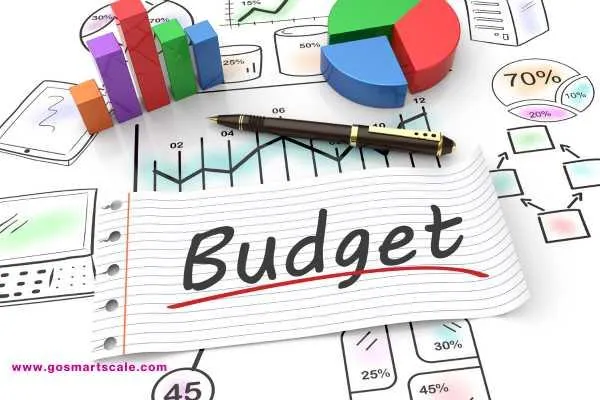The #1 Newsletter for Finance and Accounting professionals

Budgeting for Success
Nurturing Growth: Your Business Needs an Annual Budget to Thrive !
Ah, the annual budget—it's the broccoli of the business world. We might not always enjoy eating it, but we can't deny it's good for us. So let's dive into why this 'financial veggie' is essential for nurturing your business growth this year!

Guiding Your Business's Financial Journey
Think of an annual budget as a roadmap for your business's financial journey throughout the year. It provides a clear direction for your revenue, expenses, and investments.
With a budget in place, you'll have a strategic plan to guide your decisions and ensure that your financial resources are aligned with your business goals.
If you're a retail business, your budget can guide you on how much to allocate for inventory purchases based on expected sales trends.
For a service-based business, your budget can help you allocate funds for marketing campaigns aimed at attracting new clients and retaining existing ones.
Making Informed Decisions
An annual budget empowers you to make well-informed decisions. It helps you prioritize where to allocate your resources, whether it's for marketing, operations, or expansion. By having a clear picture of your financial capabilities, you can channel your efforts and investments towards initiatives that drive growth and enhance profitability.
With a budget, you can make the decision to invest in new technology to streamline your manufacturing process and increase efficiency.
If your business is planning to expand to a new location, your budget will help you allocate funds for market research, real estate, and initial setup costs.
Preventing Overspending and Waste
Budgeting acts as a financial guardrail, preventing overspending and unnecessary waste. By setting limits for various expenses, you ensure that your resources are used efficiently. This control not only helps you stay within your financial means but also maximizes your return on investment.
Your budget can help you control costs related to employee travel and entertainment, ensuring that expenses are justified by the potential business benefits.
If you're running a marketing campaign, your budget can prevent overspending by setting clear limits on advertising and promotional expenses.
Seizing Growth Opportunities
Every business encounters opportunities for growth. With an annual budget, you can allocate funds to seize these opportunities as they arise. Whether it's exploring new markets, launching new products, or investing in innovation, your budget provides the financial foundation to turn these growth possibilities into reality.
If you identify a gap in the market and decide to introduce a new product line, your budget can allocate resources for product development, manufacturing, and marketing.
Your budget can allocate funds for hiring additional staff to support increased demand during peak seasons or growth phases.
Tracking Progress and Adaptation
An annual budget isn't a static document; it's a tool for tracking your financial progress. By regularly comparing your actual financial performance with the budgeted figures, you gain insights into your business's financial health.
This information enables you to make timely adjustments and course corrections, ensuring you stay on track towards your goals.
If your budget projects higher sales than you're currently achieving, you can analyze the reasons for the shortfall and adjust your marketing or sales strategies accordingly.
If your expenses are higher than budgeted, you can identify areas where cost-cutting measures need to be implemented.
Managing Cash Flow Effectively
For business owners, cash flow management is vital. An annual budget helps you forecast your cash needs accurately, ensuring you have the liquidity to cover your operational expenses.
By planning your cash flow, you avoid cash shortages and ensure the smooth operation of your business.
Your budget can help you predict months when cash inflows might be lower than usual, allowing you to plan for necessary adjustments or bridge financing.
If you have seasonal variations in sales, your budget can guide you in building up cash reserves during peak periods to sustain operations during slower months.
Building Financial Resilience
Businesses face uncertainties and challenges. An annual budget prepares you for unexpected situations by setting aside funds for contingencies.
This financial cushion gives you the resilience to navigate unforeseen obstacles without jeopardizing your business's stability.
Your budget can allocate a portion of funds for emergency repairs or unexpected equipment replacement, ensuring that such situations don't disrupt your operations.
If your business relies heavily on a specific supplier, your budget can include provisions to address potential supply chain disruptions or price fluctuations.
Elements to Include in Your Annual Budget

When preparing an annual budget for your business, it's important to consider various elements that will give you a comprehensive view of your financial outlook.
Let's delve into these a few key components and explore how they contribute to your budgeting process.
Projected Revenue:
Estimate your anticipated income sources for the upcoming year. If you run an e-commerce store, your projected revenue might include the expected sales from different product categories, factoring in seasonal trends and potential market growth.
Fixed and Variable Costs:
Identify and categorize your fixed expenses (rent, salaries) and variable costs (marketing, supplies).
A good example for a restaurant, fixed costs could include rent and monthly utility bills, while variable costs might encompass expenses for fresh ingredients, marketing campaigns, and promotional materials.
Capital Expenditures:
Plan for investments in equipment, technology, and other assets.
If you're a manufacturing company, budgeting for capital expenditures might involve allocating funds for the purchase of new machinery that will enhance production efficiency.
Sales and Marketing:
This includes the allocation of funds for advertising, promotions, and sales initiatives.
A software company might allocate a budget for online advertising campaigns, content creation, and participation in industry events to generate leads and promote their products.
Operational Costs:
Factor in day-to-day expenses, such as utilities, maintenance, and licenses.
For example, a small retail store would consider operational costs such as electricity, store maintenance, and software subscriptions needed to manage inventory and sales.
Personnel Expenses:
Consider salaries, benefits, training, and recruitment costs. If you're a consulting firm, your personnel expenses would encompass salaries for consultants, costs of employee benefits, and investment in training programs to enhance skills.
Contingency Fund:
It’s important to set aside a portion of your budget for unexpected expenses or emergencies. Having a contingency fund would ensure that a bakery, for instance, can handle unexpected repairs or equipment breakdowns without disrupting daily operations or affecting profitability.
Now remember, these are just a few and should be adjusted to your industry and business needs !
Either way, by including these elements in your annual budget, you create a comprehensive financial plan that guides your business's growth, investment decisions, and overall financial health. Each element contributes to a holistic understanding of your business's financial landscape and empowers you to make informed choices for the future.
In conclusion, creating an annual budget is not just a financial exercise;
it's a strategic tool that empowers you to make informed decisions, prioritize investments, and navigate the unpredictable business landscape.
By embracing budgeting, you position your business for growth, resilience, and long-term success.
Think of the annual budget as the financial veggie of your business. Sure, it's not the fries you were hoping for, but hey, it keeps your bottom line healthy and sprouting!
~ ~ ~ ~ ~ ~ ~ ~ ~ ~ ~ ~ ~ ~ ~ ~ ~ ~ ~ ~ ~ ~ ~ ~ ~ ~ ~ ~ ~ ~
🤝 Together, we can unlock your business's full potential and pave the way for a prosperous future. Drop me a direct message, and let’s chat about it. Your next level of success awaits! Reach out to discuss your specific needs and challenges. Let's explore how we can help your business sell smarter, not harder.
#worksmarternotharder

Budgeting for Success
Nurturing Growth: Your Business Needs an Annual Budget to Thrive !
Ah, the annual budget—it's the broccoli of the business world. We might not always enjoy eating it, but we can't deny it's good for us. So let's dive into why this 'financial veggie' is essential for nurturing your business growth this year!

Guiding Your Business's Financial Journey
Think of an annual budget as a roadmap for your business's financial journey throughout the year. It provides a clear direction for your revenue, expenses, and investments.
With a budget in place, you'll have a strategic plan to guide your decisions and ensure that your financial resources are aligned with your business goals.
If you're a retail business, your budget can guide you on how much to allocate for inventory purchases based on expected sales trends.
For a service-based business, your budget can help you allocate funds for marketing campaigns aimed at attracting new clients and retaining existing ones.
Making Informed Decisions
An annual budget empowers you to make well-informed decisions. It helps you prioritize where to allocate your resources, whether it's for marketing, operations, or expansion. By having a clear picture of your financial capabilities, you can channel your efforts and investments towards initiatives that drive growth and enhance profitability.
With a budget, you can make the decision to invest in new technology to streamline your manufacturing process and increase efficiency.
If your business is planning to expand to a new location, your budget will help you allocate funds for market research, real estate, and initial setup costs.
Preventing Overspending and Waste
Budgeting acts as a financial guardrail, preventing overspending and unnecessary waste. By setting limits for various expenses, you ensure that your resources are used efficiently. This control not only helps you stay within your financial means but also maximizes your return on investment.
Your budget can help you control costs related to employee travel and entertainment, ensuring that expenses are justified by the potential business benefits.
If you're running a marketing campaign, your budget can prevent overspending by setting clear limits on advertising and promotional expenses.
Seizing Growth Opportunities
Every business encounters opportunities for growth. With an annual budget, you can allocate funds to seize these opportunities as they arise. Whether it's exploring new markets, launching new products, or investing in innovation, your budget provides the financial foundation to turn these growth possibilities into reality.
If you identify a gap in the market and decide to introduce a new product line, your budget can allocate resources for product development, manufacturing, and marketing.
Your budget can allocate funds for hiring additional staff to support increased demand during peak seasons or growth phases.
Tracking Progress and Adaptation
An annual budget isn't a static document; it's a tool for tracking your financial progress. By regularly comparing your actual financial performance with the budgeted figures, you gain insights into your business's financial health.
This information enables you to make timely adjustments and course corrections, ensuring you stay on track towards your goals.
If your budget projects higher sales than you're currently achieving, you can analyze the reasons for the shortfall and adjust your marketing or sales strategies accordingly.
If your expenses are higher than budgeted, you can identify areas where cost-cutting measures need to be implemented.
Managing Cash Flow Effectively
For business owners, cash flow management is vital. An annual budget helps you forecast your cash needs accurately, ensuring you have the liquidity to cover your operational expenses.
By planning your cash flow, you avoid cash shortages and ensure the smooth operation of your business.
Your budget can help you predict months when cash inflows might be lower than usual, allowing you to plan for necessary adjustments or bridge financing.
If you have seasonal variations in sales, your budget can guide you in building up cash reserves during peak periods to sustain operations during slower months.
Building Financial Resilience
Businesses face uncertainties and challenges. An annual budget prepares you for unexpected situations by setting aside funds for contingencies.
This financial cushion gives you the resilience to navigate unforeseen obstacles without jeopardizing your business's stability.
Your budget can allocate a portion of funds for emergency repairs or unexpected equipment replacement, ensuring that such situations don't disrupt your operations.
If your business relies heavily on a specific supplier, your budget can include provisions to address potential supply chain disruptions or price fluctuations.
Elements to Include in Your Annual Budget

When preparing an annual budget for your business, it's important to consider various elements that will give you a comprehensive view of your financial outlook.
Let's delve into these a few key components and explore how they contribute to your budgeting process.
Projected Revenue:
Estimate your anticipated income sources for the upcoming year. If you run an e-commerce store, your projected revenue might include the expected sales from different product categories, factoring in seasonal trends and potential market growth.
Fixed and Variable Costs:
Identify and categorize your fixed expenses (rent, salaries) and variable costs (marketing, supplies).
A good example for a restaurant, fixed costs could include rent and monthly utility bills, while variable costs might encompass expenses for fresh ingredients, marketing campaigns, and promotional materials.
Capital Expenditures:
Plan for investments in equipment, technology, and other assets.
If you're a manufacturing company, budgeting for capital expenditures might involve allocating funds for the purchase of new machinery that will enhance production efficiency.
Sales and Marketing:
This includes the allocation of funds for advertising, promotions, and sales initiatives.
A software company might allocate a budget for online advertising campaigns, content creation, and participation in industry events to generate leads and promote their products.
Operational Costs:
Factor in day-to-day expenses, such as utilities, maintenance, and licenses.
For example, a small retail store would consider operational costs such as electricity, store maintenance, and software subscriptions needed to manage inventory and sales.
Personnel Expenses:
Consider salaries, benefits, training, and recruitment costs. If you're a consulting firm, your personnel expenses would encompass salaries for consultants, costs of employee benefits, and investment in training programs to enhance skills.
Contingency Fund:
It’s important to set aside a portion of your budget for unexpected expenses or emergencies. Having a contingency fund would ensure that a bakery, for instance, can handle unexpected repairs or equipment breakdowns without disrupting daily operations or affecting profitability.
Now remember, these are just a few and should be adjusted to your industry and business needs !
Either way, by including these elements in your annual budget, you create a comprehensive financial plan that guides your business's growth, investment decisions, and overall financial health. Each element contributes to a holistic understanding of your business's financial landscape and empowers you to make informed choices for the future.
In conclusion, creating an annual budget is not just a financial exercise;
it's a strategic tool that empowers you to make informed decisions, prioritize investments, and navigate the unpredictable business landscape.
By embracing budgeting, you position your business for growth, resilience, and long-term success.
Think of the annual budget as the financial veggie of your business. Sure, it's not the fries you were hoping for, but hey, it keeps your bottom line healthy and sprouting!
~ ~ ~ ~ ~ ~ ~ ~ ~ ~ ~ ~ ~ ~ ~ ~ ~ ~ ~ ~ ~ ~ ~ ~ ~ ~ ~ ~ ~ ~
🤝 Together, we can unlock your business's full potential and pave the way for a prosperous future. Drop me a direct message, and let’s chat about it. Your next level of success awaits! Reach out to discuss your specific needs and challenges. Let's explore how we can help your business sell smarter, not harder.
#worksmarternotharder
SmartScale Insights. The #1 Newsletter for Finance and Accounting professionals
Scaling the Smart Way
The Heart of Our Philosophy: Work Smarter, Not Harder
In a world that often glorifies the "hustle," we at SmartScale take a different approach. We believe in working smarter, not harder. It's not just a catchy phrase for us; it's the cornerstone of how we operate. We're committed to delivering solutions that allow you to scale your business intelligently, using proven systems that maximize efficiency and profitability.
The entrepreneurial landscape has shifted. Gone are the days when "if you build it, they will come" was a viable strategy. Today, even the most innovative products and services can go unnoticed without a solid plan for client acquisition.
That's where we come in.
We're not just another company that sends out cold emails and calls it a day. We deliver dynamic marketing and sales assets that not only attract attention but also convert leads into loyal customers.
Crafting Your Unique Message
We collaborate closely with you and your leadership team to develop a message so compelling it practically carves out its own niche in your industry. This isn't about one-size-fits-all solutions; it's about creating a tailored strategy that resonates with your target audience.
Building Your Sales Funnel
Once we've honed in on your unique value proposition, we construct a sales funnel that's a narrative of your business journey. It's not just about listing features and benefits; it's about telling a compelling story wrapped in persuasive copywriting that could convert even the most skeptical buyer.
Traffic That Converts
Next, we identify the most effective traffic sources for your business, both paid and organic. We're talking about high-intent traffic that doesn't just visit but engages and converts. The kind of traffic that makes you realize the power of smart scaling.
Data-Driven Decisions
In the age of information,data is king. We employ next-generation tracking and data analytics to sift through the noise, helping us identify what's working and what's not. This allows us to cut the underperforming elements and scale the successful ones, ensuring that every dollar you invest yields a minimum $7-$10 return, weekly.

Is the Newsletter free?
100% free. We pride ourselves in being your 1-stop solution for scaling your Finance and Accounting business. We help you get more paying clients and automate your prospecting efforts, all in one platform. This blog site provides you with free useful tips to get started. Simply click to join our Newsletter, and get it all delivered straight to your inbox.
Who exactly are you and what do you do?
We are SmartScale. Simply put your new BFFF (Business Finance Friend Forever).
We are driven to help you Expand Your Brand. Schedule More Qualified Calls. Consistently Get More Clients for your finance or accounting business. Click the button to book a free discovery call.
Is SmartScale® right for me?
We are dedicated to help Solo Accountants & Educators, Software Companies, and Finance & Accounting Firms. If you’re marketing your business online, SmartScale is for you! SmartScale empowers you to grow your client base, offer your business solutions, and cultivate lasting customer relationships effortlessly with one streamlined, user-friendly tool.
Click the button to book a free discovery call.

